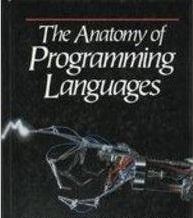
|
FreeComputerBooks.com
Links to Free Computer, Mathematics, Technical Books all over the World
|
|
- Title: Anatomy of Programming Languages
- Author(s) William R. Cook
- Publisher: The University of Texas, 2013 to 2021
- Hardcover/Paperback: N/A
- eBook: HTML and PDF (147 pages, 1.0 MB)
- Language: English
- ISBN-10: N/A
- ISBN-13: N/A
- Share This:

|
This book is a series of notes about programming languages, originally written for students of the undergraduate programming languages course at The University of Texas at Austin. It uses Haskell, a pure functional language.
Learn by doing, using Haskell. High-level outline of planned scope:
- Expressions & Variables
- First-class Functions & Closures
- Recursion, Fixed Points, Self-Application
- Aspects of Computation: Errors, State, Non-determinism (Monads)
- Parsing
- Static Analysis, Type Checking
- Data Abstraction: Objects and ADTs
- Inheritance & Delegation
- Domain-Specific Languages
- Partial Evaluation
- William R. Cook is an Associate Professor of Computer Science at The University of Texas at Austin.
- Theory of Programming Languages
- Compiler Construction
- Computer and Programming Languages
- Computer Science

- Anatomy of Programming Languages (William R. Cook)
- The Mirror Site (1) - PDF
- The Mirror Site (2) - PDF
- The Mirror Site (3) - C Edition - PDF (600 pages)
-
 Practical Foundations for Programming Languages (Robert Harper)
Practical Foundations for Programming Languages (Robert Harper)
An excellent introduction to a wide range of programming language concepts. They are all uniformly and carefully explained, using techniques that are very useful in practice for both analysis and implementation of programming languages.
-
 Programming Languages: Application and Interpretation
Programming Languages: Application and Interpretation
This book unites two approaches to teaching programming languages, one based on a survey of languages and the other on writing definitional interpreters. The main programming language used in this book is Racket.
-
 Programming Languages at a Glance (Andreas Hohmann)
Programming Languages at a Glance (Andreas Hohmann)
This book tries to explain a number of programming languages, covering a wide range from currently popular ones such as Java, Perl, Python, and C# to less known languages such as ML, Haskell.
-
 Advanced Programming Language Design (Raphael Finkel)
Advanced Programming Language Design (Raphael Finkel)
The goal of this book, is to expose first-year graduate students to a wide range of programming language paradigms and issues, so that they can understand the literature on programming languages and even conduct research in this field.
-
 Implementing Programming Languages: Compilers and Interpreters
Implementing Programming Languages: Compilers and Interpreters
This book follows a theory-based practical approach, where theoretical models serve as blueprint for actual coding. The reader is guided to build compilers and interpreters in a well-understood and scalable way.
-
 Programming and Programming Languages (Shriram Krishnamurthi)
Programming and Programming Languages (Shriram Krishnamurthi)
It's basically two books in one, integrated. One book is an introduction to programming, teaching you basic concepts of organizing data and the programs that operate over them. The other book is an introduction to programming languages.
-
 O'Reilly® Real World Haskell (Bryan O'Sullivan, et al)
O'Reilly® Real World Haskell (Bryan O'Sullivan, et al)
This easy-to-use, fast-moving tutorial introduces you to functional programming with Haskell. You'll learn how to use Haskell in a variety of practical ways, from short scripts to large and demanding applications.
-
 The Haskell School of Music - From Signals to Symphonies
The Haskell School of Music - From Signals to Symphonies
This book explores the fundamentals of computer music and functional programming through the Haskell. It explores common paradigms used in algorithmic music composition, such as stochastic generation, musical grammars, etc.
-
 Learn You a Haskell for Great Good! (Miran Lipovaca)
Learn You a Haskell for Great Good! (Miran Lipovaca)
Packed with the author's original artwork, pop culture references, and most importantly, useful example code, this book teaches functional fundamentals in a way you never thought possible.





